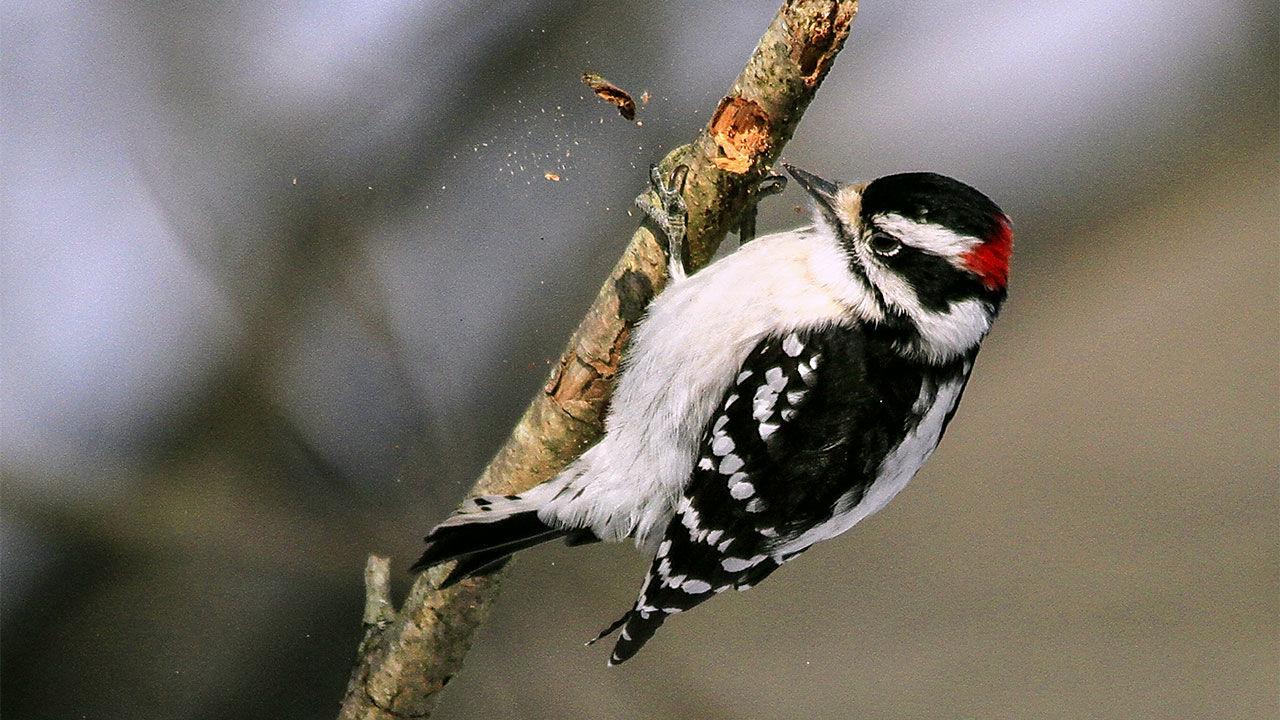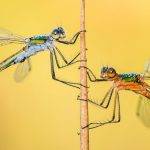Why Do Woodpeckers Peck Wood?

Are you one of the curious bird observers who have had to ask the interestingly important of question why do woodpeckers peck wood? We can’t infer that they peck because the word is in their name, even though that would make a little sense but thing is the bird isn’t even aware it’s called woodpecker. Certainly that is out of the question, let’s go further.
Woodpeckers are not the only birds with unique features or characteristics they’ve been depending on to survive in the wild, an example is the Toucan with an enormous beak that is bigger than almost every other body part of the bird.
By nature we’re all expected to exhibit different characteristics that indicate we belong to a certain animal kingdom, this is our habitat and this is exactly how we survive, apparently that is what we can say about woodpeckers. We can summarily say woodpeckers peck because they live in the woods, they depend on pecking to survive because it enables them carry out certain life activities they wouldn’t normally be able to do without the ability to peck wood.
This is a very short reason I think woodpeckers peck, but for a more concise explanation on why woodpeckers peck you have to read further below.
Why Do Woodpeckers Peck Wood?
Pecking Is A Habit To Woodpeckers
Not so many birds have the same ability as woodpeckers. Unlike most birds, the necks and beaks of woodpeckers are strong, and this allows them to peck woods constantly without harming themselves. Woodpeckers can peck 10,000 times a day. Their necks serve as a natural shocker absorber because of its strong nature. This helps them balance the vibration to avoid concussions. All of these advantages makes pecking a super easy and fun thing to do by woodpeckers.
Learn the animal group names of woodpeckers and other animals.
They Peck To Build Nest
Most birds build their nests by collecting twigs, but woodpeckers do not. However, they make use of their carving ability to build their homes. They make holes by pecking on woods; these holes serve as their nests. When woodpeckers create numerous small holes on tree bark, they use the extra holes to store food. However, when the holes are larger, they are meant to be used for nests.
Pecking Aids Communication Marking Of Territory
Since pecking is an absolute way of life for woodpeckers, it makes more sense incorporating it into every other aspects of living including communication. By nature, woodpeckers do not sing or hum like other birds, they make up for these inabilities with their excellent ability to peck and make sounds from pecking of wood. They make tapping sound by drumming the trees instead of tweeting like many other tiny birds. This also helps them scare off predators as well as attract their mates. Marking of territory is a way all animals use to notify others of their presence and ownership of a given space. We humans do so with the use of fences, barriers and other structures of demarcation. Every animals do the same in their own unique way, hence woodpeckers are not left behind in this shared sense of territorial ownership, they have their own way of marking territories which simply is with the use of pecking. They also use their drumming ability to notify other birds of their presence.
Woodpeckers Peck To Find Food
Every creature has its way of finding food, so do woodpeckers! For example, eagles hunt for food by dipping their feet in water to catch fish. Woodpeckers do theirs in a different way. When they come across ants, larvae, or any other species of insects in the wood, they start pecking in a bid to get to them. And when an opening is created on the tree bark, they use their long tongue to get to the insects.
Some Downsides Of Pecking By Woodpeckers
Woodpeckers many times peck without minding. Though they do not bear causing damages in mind while doing this, the trait is used as a survival tactic. This means that they destroy wood intentionally; it is a way to guarantee their comfort and security. There are several reports all over North America of properties being damaged and destroyed by woodpeckers. It is worse in areas where there are plenty of woodpeckers. There was once a report from The Canadian Broadcasting Corporation reported that woodpeckers had damaged thousands of dollars’ worth of property of the Prince George Hotel in a bit to mark their territory. There also another report of woodpeckers pecking newly built properties owned by Courtyard Marriot Hotel, as usual it cost thousands of dollars to repair the damages caused. A quick research brings up more and more of such reports. From these reports it’s safe to say that woodpeckers are one of the most destructive little animals in the wood.
That’s it about woodpeckers and why they peck, we’ll try too answer some of the most popular frequently asked questions asked by people who interested in knowing why woodpeckers peck.
FAQ About Why Woodpeckers Peck Wood
Do Woodpeckers communicate through pecking?
Yes, woodpeckers communicated through pecking because pecking is their primary mode of communication as they don’t sing or tweet due to not being vocal birds.
How do you get rid of woodpeckers pecking at your house?
You get rid of woodpeckers pecking at your house by hanging shiny objects that reflects light on the places they’ve been pecking, this is one thing that scares the bird very much they’d never return. Some of such reflective objects are CDs, reflective tapes, foil strips and similar objects.
Do Woodpeckers peck at night?
No, woodpeckers do not peck at night because like most birds they sleep at night and do not carry out any pecking activities in the night, those are reserved for the day.
What kind of tree does a woodpecker peck?
Woodpeckers prefer pecking on softer woods for obvious reasons, they do not like to peck on hard woods as it makes things hard for them. Some known softwoods are Cedars and pines. Also, they prefer dead or dying trees for the same reason, dead trees are software than living ones.
What do woodpeckers hate?
There are primarily two things we know woodpeckers hate, they are shiny reflective objects and woodpecker repellant, we don’t know why they’re scared of shiny objects but they hate woodpecker repellants because it causes indigestion.
What are woodpeckers pecking for?
Woodpeckers peck for many things such as;
- Food.
- To communicate.
- To mark territory.
- To have fun
These reasons why woodpeckers peck have been explained up above to get an idea scroll up.
Do windchimes scare woodpeckers?
Yes, windchimes scare woodpeckers especially if they’re shiny and reflective. Other things that scare them are CDs, foil strips and more.
How do you scare away woodpeckers?
To scare away woodpeckers you have to hang shiny objects that reflects light on the places they’ve been pecking, this is one thing that scares the bird very much they’d never return. Some of such reflective objects are CDs, reflective tapes, foil strips and similar objects.
Why is woodpecker pecking at my house?
Woodpeckers are pecking at your house for many reasons which could be any or all of the following;
- It has claimed territory there.
- It’s trying to communicate to other birds.
- It’s enjoying the loud sound it makes.
- It’s pecking in search of food.
Do fake owls scare away woodpeckers?
Yes, fake owls scare away woodpeckers. There has been reports of fake owls which are made of plastic being effective at scaring away woodpeckers, this is because owls are known aggressors to woodpeckers.
How long do woodpeckers peck?
The duration of pecking for woodpeckers varies depending on what they’re pecking for, if they’re pecking in search of food, they’d stop temporarily when enough has been found. If they’re pecking to communicate it could take a little longer.
How fast do woodpeckers peck?
20 times per second. Woodpeckers are very fast at their craft, they peck at a very rate of 20 pecks per second.



